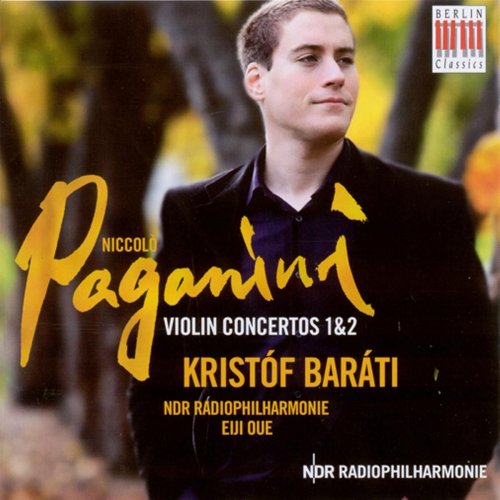
Kristóf Baráti, NDR Radiophilharmonie, Eiji Oue - Paganini: Violin Concertos Nos. 1 & 2 (2009)
BAND/ARTIST: Kristóf Baráti, NDR Radiophilharmonie, Eiji Oue
- Title: Paganini: Violin Concertos Nos. 1 & 2
- Year Of Release: 2009
- Label: Berlin Classics
- Genre: Classical
- Quality: flac lossless (tracks)
- Total Time: 01:05:39
- Total Size: 288 mb
- WebSite: Album Preview
Tracklist
01. Violin Concerto No. 1 in D Major, Op. 6: I. Allegro Maestoso (Cadenza: Émile Sauret)
02. Violin Concerto No. 1 in D Major, Op. 6: II. Adagio
03. Violin Concerto No. 1 in D Major, Op. 6: III. Rondo: Allegro Spiritoso
04. Violin Concerto No. 2 in B Minor, Op. 7 "La Campanella": I. Allegro Maestoso (Cadenza: Kristóf Baráti)
05. Violin Concerto No. 2 in B Minor, Op. 7 "La Campanella": II. Adagio
06. Violin Concerto No. 2 in B Minor, Op. 7 "La Campanella": III. Rondo: Allegretto Moderato
While Paganini was an unquestioned master of violin technique, he often claimed to have struggled greatly with compositions. This is especially true of longer works, like concertos. The first two concertos, heard on this Berlin Classics album, took the venerable virtuoso years to complete. The later concertos, by contrast, were written within a very short period of time. These concertos were clearly written primarily as a tool for Paganini to demonstrate his own skills; like the concertos of Chopin, the orchestral part is of secondary (if even that) importance. Conductor Eiji Oue and the NDR Radiophilharmonie Hannover, however, give the impression that the orchestral accompaniment is of tantamount interest. Tutti sections are obnoxiously overplayed, with timpani and brass blaring away with little sense of finesse. Oue is joined by young violinist Kristóf Baráti; after his debut album of the Bach sonatas and partitas, Baráti seems interested in taking on huge projects right out of the gate. His performance of the Paganini concertos shows him to be a talented young musician with an abundant - though not always sufficient - technique. There are some moments when intonation and sound quality suffer, and in works that put so much careful focus on the violin, they are rather easily detected. In general, however, his playing is warm and sensitive, with ample amounts of playfulness and spontaneity. While certainly not definitive recordings of these works, this album shows Baráti to be an artist to watch as he continues to mature.
01. Violin Concerto No. 1 in D Major, Op. 6: I. Allegro Maestoso (Cadenza: Émile Sauret)
02. Violin Concerto No. 1 in D Major, Op. 6: II. Adagio
03. Violin Concerto No. 1 in D Major, Op. 6: III. Rondo: Allegro Spiritoso
04. Violin Concerto No. 2 in B Minor, Op. 7 "La Campanella": I. Allegro Maestoso (Cadenza: Kristóf Baráti)
05. Violin Concerto No. 2 in B Minor, Op. 7 "La Campanella": II. Adagio
06. Violin Concerto No. 2 in B Minor, Op. 7 "La Campanella": III. Rondo: Allegretto Moderato
While Paganini was an unquestioned master of violin technique, he often claimed to have struggled greatly with compositions. This is especially true of longer works, like concertos. The first two concertos, heard on this Berlin Classics album, took the venerable virtuoso years to complete. The later concertos, by contrast, were written within a very short period of time. These concertos were clearly written primarily as a tool for Paganini to demonstrate his own skills; like the concertos of Chopin, the orchestral part is of secondary (if even that) importance. Conductor Eiji Oue and the NDR Radiophilharmonie Hannover, however, give the impression that the orchestral accompaniment is of tantamount interest. Tutti sections are obnoxiously overplayed, with timpani and brass blaring away with little sense of finesse. Oue is joined by young violinist Kristóf Baráti; after his debut album of the Bach sonatas and partitas, Baráti seems interested in taking on huge projects right out of the gate. His performance of the Paganini concertos shows him to be a talented young musician with an abundant - though not always sufficient - technique. There are some moments when intonation and sound quality suffer, and in works that put so much careful focus on the violin, they are rather easily detected. In general, however, his playing is warm and sensitive, with ample amounts of playfulness and spontaneity. While certainly not definitive recordings of these works, this album shows Baráti to be an artist to watch as he continues to mature.
As a ISRA.CLOUD's PREMIUM member you will have the following benefits:
- Unlimited high speed downloads
- Download directly without waiting time
- Unlimited parallel downloads
- Support for download accelerators
- No advertising
- Resume broken downloads


